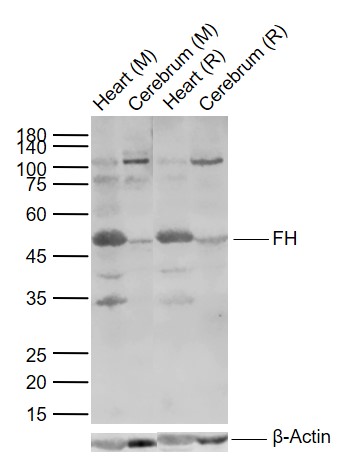Fumarate hydratase antibody
GTX109877
ApplicationsImmunoFluorescence, Western Blot, ImmunoCytoChemistry, ImmunoHistoChemistry, ImmunoHistoChemistry Paraffin
Product group Antibodies
ReactivityHuman, Mouse, Rat
TargetFH
Overview
- SupplierGeneTex
- Product NameFumarate hydratase antibody
- Delivery Days Customer9
- Application Supplier NoteWB: 1:500-1:3000. ICC/IF: 1:100-1:1000. IHC-P: 1:100-1:1000. *Optimal dilutions/concentrations should be determined by the researcher.Not tested in other applications.
- ApplicationsImmunoFluorescence, Western Blot, ImmunoCytoChemistry, ImmunoHistoChemistry, ImmunoHistoChemistry Paraffin
- CertificationResearch Use Only
- ClonalityPolyclonal
- Concentration1.51 mg/ml
- ConjugateUnconjugated
- Gene ID2271
- Target nameFH
- Target descriptionfumarate hydratase
- Target synonymsFMRD, HLRCC, HsFH, LRCC, MCL, MCUL1, fumarate hydratase, mitochondrial, epididymis secretory sperm binding protein, fumarase
- HostRabbit
- IsotypeIgG
- Protein IDP07954
- Protein NameFumarate hydratase, mitochondrial
- Scientific DescriptionThe protein encoded by this gene is an enzymatic component of the tricarboxylic acid (TCA) cycle, or Krebs cycle, and catalyzes the formation of L-malate from fumarate. It exists in both a cytosolic form and an N-terminal extended form, differing only in the translation start site used. The N-terminal extended form is targeted to the mitochondrion, where the removal of the extension generates the same form as in the cytoplasm. It is similar to some thermostable class II fumarases and functions as a homotetramer. Mutations in this gene can cause fumarase deficiency and lead to progressive encephalopathy. [provided by RefSeq]
- ReactivityHuman, Mouse, Rat
- Storage Instruction-20°C or -80°C,2°C to 8°C
- UNSPSC12352203
References
- Miettinen M, Felisiak-Golabek A, Wasag B, et al. Fumarase-deficient Uterine Leiomyomas: An Immunohistochemical, Molecular Genetic, and Clinicopathologic Study of 86 Cases. Am J Surg Pathol. 2016,40(12):1661-1669.Read this paper
- Lo YW, Lin ST, Chang SJ, et al. Mitochondrial proteomics with siRNA knockdown to reveal ACAT1 and MDH2 in the development of doxorubicin-resistant uterine cancer. J Cell Mol Med. 2015,19(4):744-59. doi: 10.1111/jcmm.12388Read this paper






![ICC/IF analysis of COS7 cells transiently transfected with Fumarate hydratase plasmid using GTX84498 Fumarate hydratase antibody [9G4].](https://www.genetex.com/upload/website/prouct_img/normal/GTX84498/GTX84498_1107_ICCIF_w_23061420_437.webp)
![ICC/IF analysis of COS7 cells transiently transfected with Fumarate hydratase plasmid using GTX84499 Fumarate hydratase antibody [2A2].](https://www.genetex.com/upload/website/prouct_img/normal/GTX84499/GTX84499_1108_ICCIF_w_23061420_134.webp)